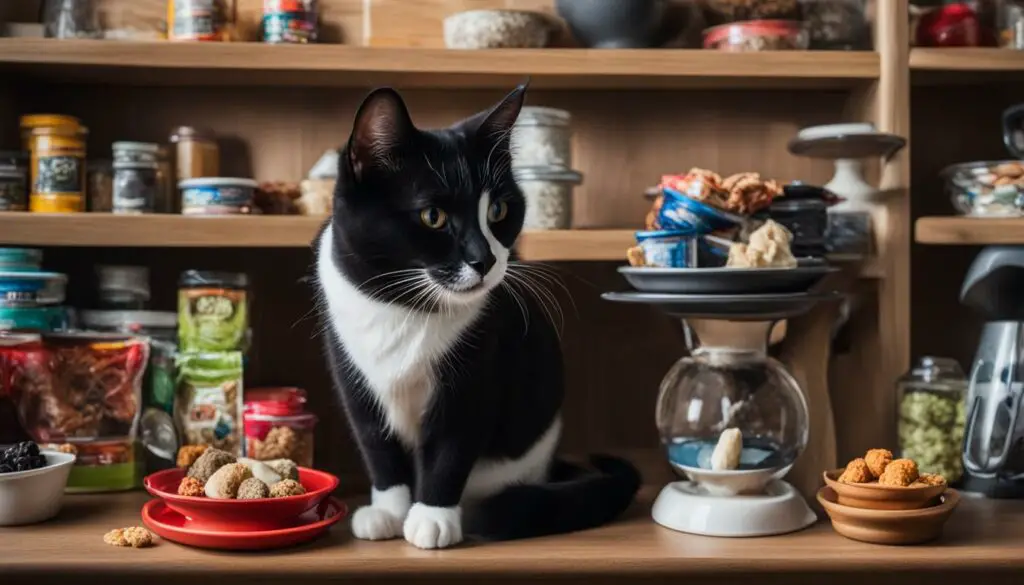Cats can be persistent when it comes to begging for food, and it can be frustrating for cat owners. However, understanding the reasons behind this behavior and implementing effective strategies can help you curb your cat’s food begging habits. In this ultimate guide, I will provide expert tips and techniques to stop your cat from begging for food, covering cat training, cat behavior, food discipline, and obedience measures.
Begging for food is a natural behavior for cats, but it can be managed with proper training and discipline. By implementing the techniques outlined in this guide, you can create a healthier relationship with food for your cat and maintain their overall well-being.
Let’s dive into the various factors that contribute to your cat’s food begging behavior and explore practical solutions to address them.
Key Takeaways:
- Understanding your cat’s natural behavior and instincts can help you address their food begging habits effectively.
- A lack of nutrients, seeking attention, abnormal feeding behavior, teasing from the food bowl, worms, and medical conditions like hyperthyroidism can contribute to your cat’s constant hunger and begging for food.
- Establishing a balanced and nutritious diet, incorporating mental and physical stimulation, setting mealtime boundaries, and seeking professional help if needed are key steps to stop your cat from begging for food.
- Consistency, patience, and positive reinforcement are essential when training your cat to break the begging habit.
- Creating a stimulating environment and providing interactive feeding toys can help reduce your cat’s focus on food and prevent boredom-related begging behavior.
Why is My Cat Always Hungry?
Cats are known for their insatiable appetite, but have you ever wondered why your cat always seems hungry? There can be several reasons for this behavior, ranging from natural instincts to underlying health issues. Understanding the root cause of your cat’s constant hunger is crucial in addressing their behavior effectively.
One common reason for a cat’s constant hunger is their natural instinct for routine feeding times. Cats are creatures of habit and they associate certain times of the day with mealtime. If your cat is meowing or begging for food, they may simply be following their internal clock, expecting their next meal to be served.
Another reason why your cat may seem hungry all the time is if they have formed an association between certain behaviors and receiving food. For example, if your cat meows and you immediately give them a treat, they will learn that meowing equals food. This can create a cycle of constant begging and reinforcement of the behavior.
| Reasons for Cat’s Constant Hunger | Solutions |
|---|---|
| Natural instinct for routine feeding times | Stick to a consistent feeding schedule |
| Food association with certain behaviors | Ignore begging behavior and provide treats at designated times |
| Underlying health issues | Consult with a veterinarian to rule out any medical conditions |
However, if your cat’s constant hunger persists despite a regular feeding schedule and no reinforcement of begging behavior, it is important to consider potential health issues. Conditions such as hyperthyroidism or diabetes can cause increased appetite in cats. If you suspect that your cat’s constant hunger is due to a medical issue, it is essential to consult with a veterinarian for a proper diagnosis and appropriate treatment.
In summary, a cat’s constant hunger can be attributed to various factors, including natural instincts for routine feeding times and associations between behaviors and receiving food. However, if the constant hunger persists and is accompanied by other concerning symptoms, it is important to consult with a veterinarian to rule out any underlying health issues.
Lack of Nutrients and Seeking Attention
A lack of nutrients in your cat’s diet can contribute to their incessant begging for food. Cats have specific dietary needs, and it’s essential to ensure that they are receiving a balanced and nutritious meal. A well-rounded diet will help satisfy their hunger and reduce their urge to beg.
Additionally, cats may resort to begging for food as a way to seek attention. If they feel neglected or if their daily routine is disrupted, they may utilize begging as a means of getting noticed. Providing your cat with regular interaction, playtime, and quality time can help fulfill their need for attention and lessen their reliance on food-related behaviors.
It’s important to remember that cats are intelligent creatures, and they can quickly associate begging with receiving food or attention. Consistency and discipline in establishing boundaries around mealtime and ignoring their begging behavior can help break the habit. Patience and persistence are key when addressing these issues and creating a healthier relationship with food for your cat.
| Signs of a cat seeking attention | Signs of a cat lacking nutrients |
|---|---|
|
|
By addressing the lack of nutrients in your cat’s diet and providing them with adequate attention and stimulation, you can help reduce their need to beg for food. Creating a balanced feeding routine and ensuring their meals meet their nutritional needs will contribute to their overall well-being and contentment.
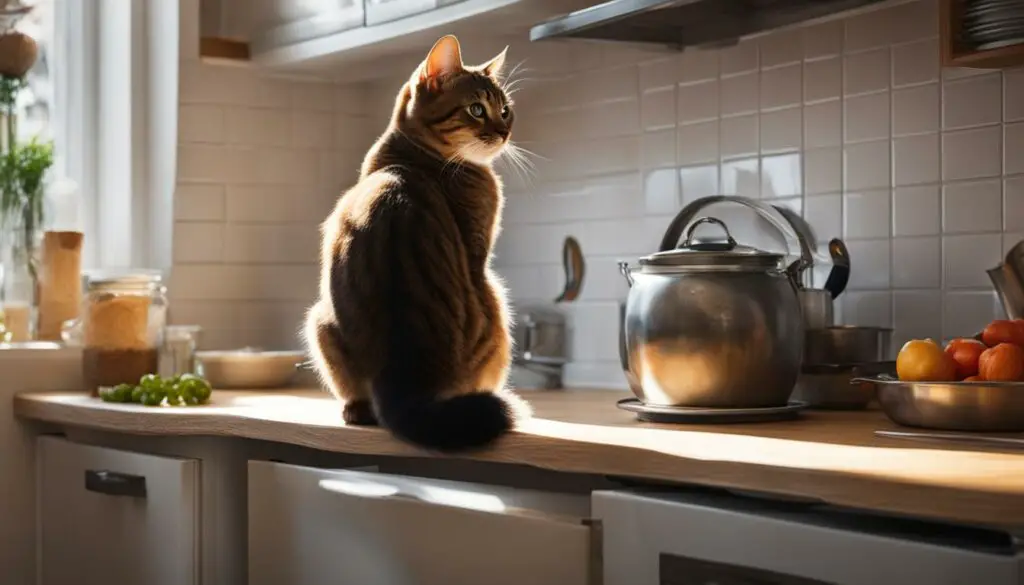
Abnormal Feeding Behavior and Teasing with Food Bowl
Some cats may exhibit abnormal feeding behavior, such as aggression or excessive appetite, which can contribute to their begging for food. This abnormal behavior is known as psychogenic abnormal feeding behavior and is often caused by emotional stress. Cats may resort to this behavior as a means to cope with anxiety or insecurity.
To address this issue, it is important to provide your cat with a calm and stress-free environment. Engage in regular playtime sessions to help them release any pent-up energy and redirect their focus away from food. Creating positive associations with mealtime can also help change your cat’s attitude towards food. Provide praise and rewards for calm behavior during mealtimes, reinforcing the idea that food is not a scarce resource.
Teasing your cat with the food bowl can further contribute to begging behavior. To prevent this, remove the food bowl immediately after mealtime to eliminate the temptation for your cat to beg for more food. Additionally, avoid eating in front of your cat or giving them table scraps, as this can encourage begging behavior.
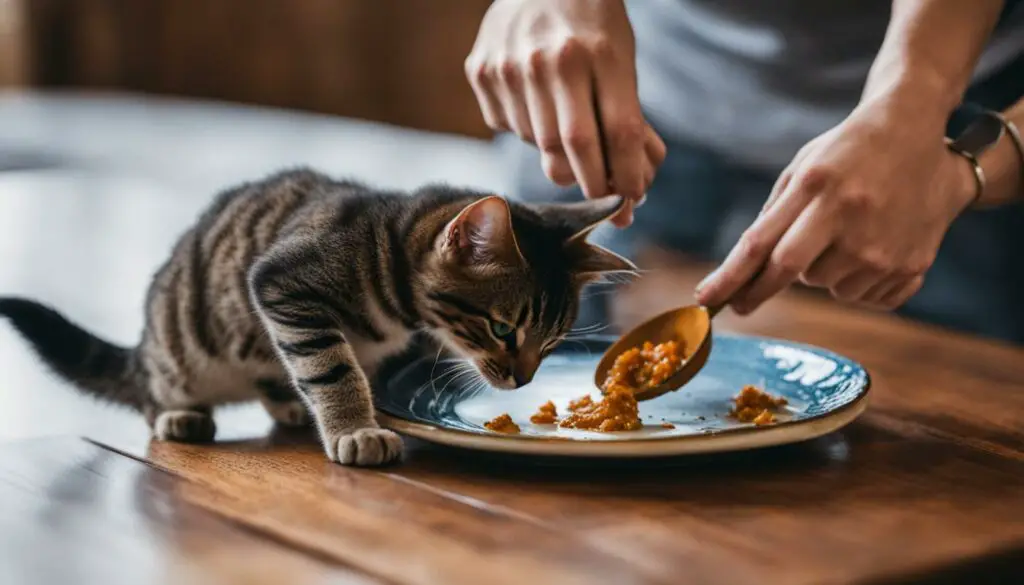
Psychogenic Abnormal Feeding Behavior
Psychogenic abnormal feeding behavior in cats may stem from factors such as anxiety, boredom, or a need for control. If your cat’s abnormal feeding behavior persists despite your efforts, it may be helpful to consult a veterinarian or animal behaviorist. They can provide professional guidance and develop a tailored behavior modification plan to address the underlying causes of the abnormal feeding behavior.
Signs of Abnormal Feeding Behavior
- Aggressive behavior towards other pets or humans during mealtime
- Excessive begging, meowing, or pacing before or during mealtimes
- Rapid eating or food gulping
- Obsessive focus on food and inability to be distracted
- Resistance or aggression when attempting to redirect their attention
Creating a Calm Feeding Environment
- Designate a quiet and secluded feeding area for your cat
- Use interactive food puzzles or slow feeder bowls to promote slower eating
- Establish a consistent feeding schedule to provide a sense of security
- Ensure your cat has access to fresh water at all times
- Monitor your cat’s weight and adjust their portion sizes accordingly
Worms and Their Impact on Hunger
When it comes to cats constantly begging for food, worms can be a hidden culprit. These pesky parasites can cause cats to feel constantly hungry as they steal nutrients from their food. Common types of worms that affect cats include tapeworms and roundworms, which are often contracted through infected prey, fleas, or contact with slugs and snails.
Table: Types of Worms and Their Impact on Hunger
| Worm Type | How it is contracted | Impact on Hunger |
|---|---|---|
| Tapeworms | Ingesting infected fleas or prey | Steal nutrients from food, leading to constant hunger |
| Roundworms | Ingesting infected prey or contaminated soil | Compete for nutrients in the digestive system, causing increased appetite |
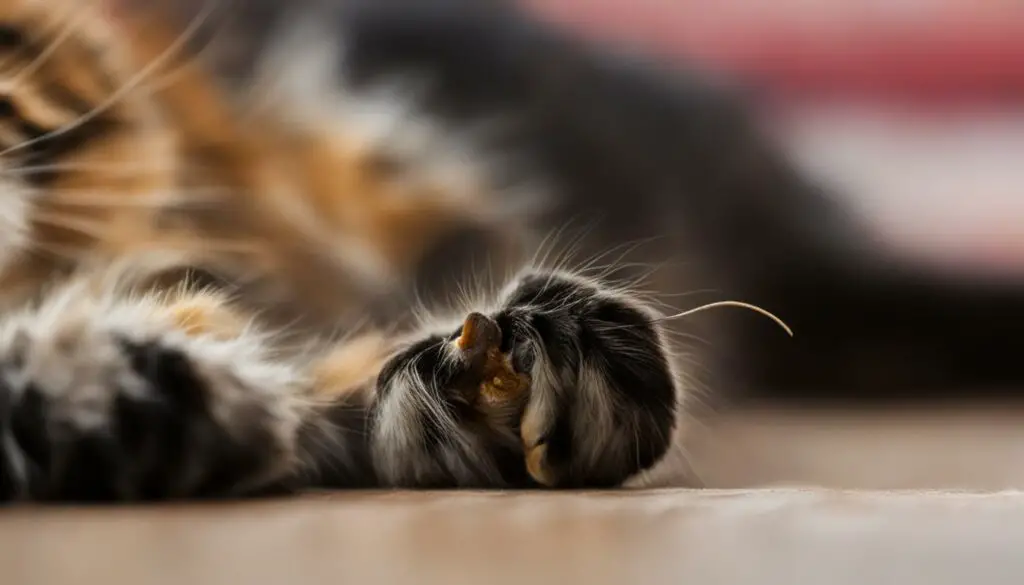
If your cat has worms, they may exhibit increased hunger as their bodies try to compensate for the lack of nutrients. Regular worming is crucial to prevent worms and alleviate the hunger caused by their presence. Consult your veterinarian for the appropriate deworming schedule and products suitable for your cat’s specific needs.
Remember, keeping your cat free from worms not only helps regulate their appetite but also ensures their overall health and well-being.
Hyperthyroidism and Increased Appetite
Hyperthyroidism is a common condition in cats that can lead to increased appetite and weight loss. It occurs due to the overproduction of thyroid hormones, which play a vital role in regulating metabolism. When the thyroid gland becomes overactive, it causes the body to accelerate metabolic processes, resulting in an increased need for energy and subsequent hunger.
Cats with hyperthyroidism often exhibit a ravenous appetite, despite consuming larger quantities of food. This can be confusing for pet owners, as the increased intake may not lead to weight gain but rather weight loss. The excessive thyroid hormone secretion ramps up the metabolic rate, causing the body to burn calories at a rapid pace. As a result, cats with hyperthyroidism may experience significant weight loss, even with a voracious appetite.
If you suspect that your cat may have hyperthyroidism, it’s crucial to consult your veterinarian for proper diagnosis and treatment options. The vet will perform a thorough examination and may recommend blood tests to measure thyroid hormone levels. Treatment for hyperthyroidism can include medication, surgery, or radioactive iodine therapy, depending on the severity of the condition. Managing your cat’s thyroid hormone levels can help regulate their appetite and promote weight stability.

Common Symptoms of Hyperthyroidism in Cats
- Increased appetite
- Weight loss
- Hyperactivity
- Excessive thirst
- Frequent urination
- Vomiting
- Diarrhea
Hyperthyroidism can have a significant impact on a cat’s appetite and weight. It’s important to seek veterinary care if you notice any changes in your cat’s eating habits or sudden weight loss.”
– Dr. Emily Thompson, DVM
| Treatment Options | Pros | Cons |
|---|---|---|
| Medication | – Non-invasive – Effective in most cases – Immediate symptom relief |
– Lifelong medication required – Potential side effects |
| Surgery | – Permanent solution – No need for daily medication |
– Requires general anesthesia – Surgical risks – Expensive |
| Radioactive Iodine Therapy | – Highly effective – Non-invasive – No daily medication required |
– Expensive – Requires specialized facilities – Limited availability |
Am I Feeding My Cat Enough During the Day?
Feeding your cat the right amount of food is crucial for their health and well-being. As cat owners, it’s important to determine the appropriate feeding portions and establish a feeding schedule that suits your cat’s needs. Providing your cat with the correct calorie intake ensures they maintain a healthy weight and receive the necessary nutrients for their daily activities.
When deciding on the feeding portions for your cat, several factors should be taken into consideration. The breed, age, activity level, and body condition of your cat can impact the amount of food they require. An active adult cat typically needs around 240 calories per day. However, it’s always best to consult your veterinarian to determine the specific calorie needs of your cat.
Creating a feeding schedule is equally important in regulating your cat’s food intake. Establishing regular mealtimes helps your cat develop a routine and prevents them from becoming overly hungry or begging for food throughout the day. Divide your cat’s daily food portion into multiple meals, and try to stick to a consistent schedule.
To ensure you’re providing the right amount of food, consider using a measuring cup or scale to accurately portion your cat’s meals. This helps prevent overfeeding or underfeeding, ensuring your cat maintains a healthy weight. Monitoring your cat’s body condition and adjusting their feeding portions accordingly is key to their overall well-being.

How to Break the Begging Habit
Addressing your cat’s begging behavior requires a combination of strategies. By implementing these techniques, you can train your cat to have better mealtime manners and reduce their begging habits.
Establish Mealtime Rules
Setting clear boundaries and rules during mealtime is essential for curbing begging behavior. Designate a specific feeding area for your cat and establish a consistent mealtime routine. Avoid feeding your cat from your own plate or giving in to their demands for treats. Consistency is key in teaching your cat that begging will not be rewarded.
Provide Mental Stimulation
One effective way to reduce begging behavior is by introducing a food puzzle bowl. These interactive feeding toys make mealtime more engaging and provide mental stimulation for your cat. They slow down eating, making your cat feel fuller and less inclined to beg for more food. Additionally, incorporating playtime and interactive toys into your cat’s daily routine can prevent boredom and reduce their focus on food.
Stay Firm and Ignore Begging
Ignoring your cat’s begging behavior can be challenging, but it’s crucial to remain firm and consistent. Giving in to their demands only reinforces the behavior. Instead, provide positive attention during designated meal times and ignore their begging at other times. Show love and attention to your cat in ways that are not food-related to establish a healthier relationship with them.
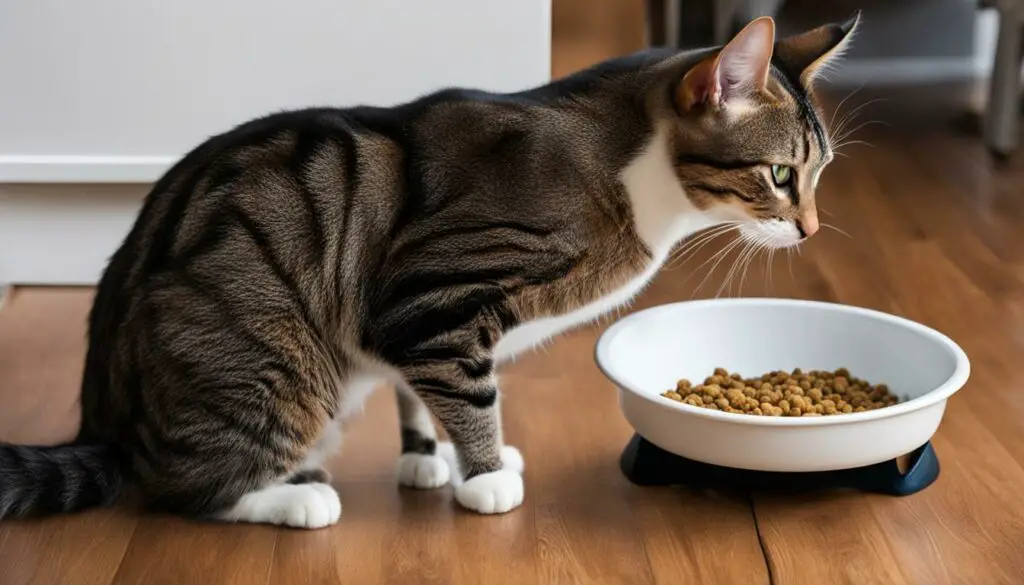
| Techniques | Benefits | |
|---|---|---|
| 1 | Establish mealtime rules | Teaches your cat boundaries and consistent behavior |
| 2 | Provide mental stimulation | Reduces focus on food and prevents boredom |
| 3 | Stay firm and ignore begging | Shows your cat that begging will not be rewarded |
Stand Firm and Ignore the Begging
When it comes to dealing with your cat’s begging behavior, it’s important to stay firm and consistent. Giving in to their demands only reinforces the behavior and encourages them to continue begging. Instead, it’s crucial to show love and attention to your cat in ways that are not food-related.
During designated meal times, provide positive attention and praise your cat for their good behavior. This will reinforce the idea that they will be rewarded during these specific times. However, outside of meal times, it’s important to ignore their begging completely. This may be difficult at first, but with consistency, your cat will start to understand that begging will not result in any positive reinforcement.
Remember, cats are intelligent animals, and they quickly learn cause and effect. If they realize that begging leads to receiving food, they will continue the behavior. By standing firm and ignoring their begging, you are helping to break the cycle and encourage more appropriate behaviors.
Why Ignoring Cat Begging is Important
Ignoring your cat’s begging behavior is essential because it helps discourage attention-seeking behavior. Cats are known for their independent nature, but they also crave interaction and stimulation. When they learn that begging brings attention, even if it’s negative attention, they are more likely to continue the behavior.
Ignoring your cat’s begging behavior might be difficult, but it’s important to remain firm and consistent. Giving in to their demands only reinforces the behavior. Instead, provide positive attention during designated meal times and ignore their begging at other times.
By ignoring your cat’s begging, you are teaching them that they will only receive attention and rewards during appropriate times, such as meal times. This helps establish boundaries and reinforces positive behavior. It may take some time for your cat to adjust, but with patience and consistency, you can effectively curb their begging behavior.
The Importance of Consistency in Cat Discipline
Consistency is key when it comes to disciplining your cat. Cats thrive on routine and predictability, so it’s important to establish clear rules and boundaries. This includes being consistent in ignoring their begging behavior. If you give in to their demands occasionally, it will only confuse them and make it harder to break the habit.
When disciplining your cat, it’s important to remember that punishment is not effective. Cats do not respond well to punishment and it can damage the bond between you and your furry friend. Instead, focus on positive reinforcement and rewarding desired behaviors. By staying consistent in your discipline approach and ignoring their begging behavior, you can help your cat understand what is expected of them and encourage more appropriate behaviors in the long run.
Introduce a Food Puzzle Bowl
If you’re looking for a fun and interactive way to keep your cat mentally stimulated during mealtime, consider introducing a food puzzle bowl. These innovative feeding devices are designed to engage your cat’s natural hunting instincts and make mealtime more challenging and engaging.
Food puzzle bowls come in various shapes and designs, but the concept is the same – your cat has to work to access their food. Some puzzle bowls have hidden compartments or obstacles that your cat must navigate to reach their food, while others require them to manipulate sliding or rotating pieces to reveal the tasty rewards.
Not only do food puzzle bowls provide mental stimulation for your cat, but they also help slow down their eating. Many cats tend to eat quickly, which can lead to digestive issues and overeating. By making your cat work for their food, puzzle bowls encourage them to eat at a slower pace, promoting better digestion and preventing overeating.
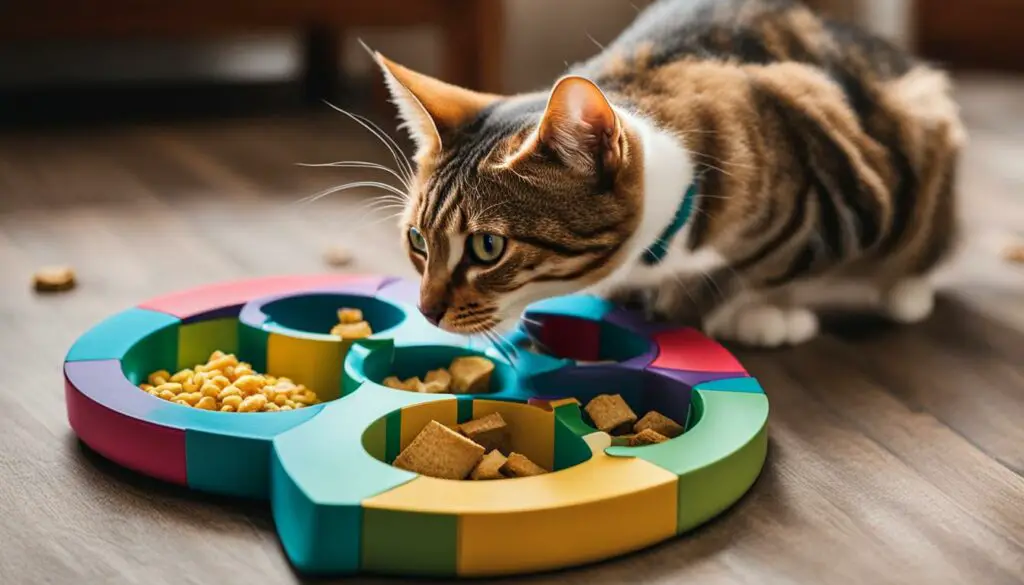
When choosing a food puzzle bowl for your cat, consider their skill level and preferences. Start with an easier puzzle and gradually introduce more challenging ones as your cat becomes more experienced. It’s also essential to monitor your cat while they use the puzzle bowl to ensure they are not becoming frustrated or stressed.
Incorporating a food puzzle bowl into your cat’s mealtime routine can provide mental stimulation, slow down their eating, and make mealtime more enjoyable. It’s a great way to keep your cat entertained and satisfied while reducing their desire to beg for more food.
Consult a Behaviorist
If your cat’s begging behavior persists despite your efforts, it may be beneficial to seek the help of a professional cat behaviorist. Cat behavior specialists are trained professionals who can assess the root cause of your cat’s begging behavior and provide tailored recommendations to address it. They have a deep understanding of feline behavior and can offer valuable insights into why your cat is begging for food and how to modify their behavior effectively.
A cat behavior consultation with a professional can provide you with a comprehensive evaluation of your cat’s behavior and create a customized behavior modification plan specifically designed for your cat’s needs. Through this process, the behaviorist will work closely with you to identify triggers, establish a new routine, and implement positive reinforcement techniques to discourage begging behavior.
Professional cat training is crucial in cases where the begging behavior is causing significant distress to you or your cat. These experts can provide guidance on how to effectively communicate with your cat, create appropriate boundaries, and reinforce positive behaviors. With their help, you can make significant progress in stopping your cat’s begging behavior and improving the overall relationship between you and your furry friend.
Remember to be patient throughout the training process, as behavior modification takes time. By consulting a behaviorist, you are taking proactive steps towards understanding and addressing your cat’s begging behavior, ensuring a happier and more harmonious environment for both you and your beloved feline companion.
| Advantages of Consulting a Behaviorist | Disadvantages of Ignoring Professional Help |
|---|---|
|
|
The Importance of Proper Feeding Habits
When it comes to feeding your cat, establishing proper habits is essential for their well-being. This includes avoiding excessive treats and rewards, establishing a consistent feeding routine, and maintaining discipline around food. By following these guidelines, you can promote a healthy relationship with food and prevent begging behavior in your furry friend.
The Role of Cat Treats and Food Rewards
 While it’s tempting to indulge your cat with treats and food rewards, it’s important to exercise moderation. Too many treats can lead to weight gain and disrupt your cat’s balanced diet. Reserve treats for special occasions or as a reward for good behavior. Opt for healthier options such as freeze-dried meat or special dental treats that promote oral hygiene.
While it’s tempting to indulge your cat with treats and food rewards, it’s important to exercise moderation. Too many treats can lead to weight gain and disrupt your cat’s balanced diet. Reserve treats for special occasions or as a reward for good behavior. Opt for healthier options such as freeze-dried meat or special dental treats that promote oral hygiene.
Table: Comparison of Common Cat Treats
| Treat Brand | Ingredients | Calories per Serving |
|---|---|---|
| Purrfectly Healthy | Chicken, Sweet Potato, Tapioca Starch | 5 kcal |
| Catch of the Day | Tuna, Fish Oil, Brown Rice | 3 kcal |
| Meow Mix Crunch | Chicken By-Product Meal, Corn Flour, Soybean Meal | 10 kcal |
The Importance of a Consistent Feeding Routine
Establishing a regular feeding routine can help reduce your cat’s food-related anxieties and minimize begging behavior. Feed your cat at the same times each day, providing appropriate portion sizes based on their age, weight, and activity level. Avoid free-feeding, as it can lead to overeating. Stick to the recommended daily calorie intake for your cat’s specific needs.
Table: Typical Feeding Schedule for Adult Cats
| Meal | Time | Portion Size |
|---|---|---|
| Breakfast | 8:00 AM | 1/4 cup dry food |
| Lunch | 12:00 PM | 1/4 cup wet food |
| Dinner | 6:00 PM | 1/4 cup dry food |
Maintaining Discipline Around Food
Discipline is key when it comes to preventing begging behavior in cats. Avoid giving in to their demands for food outside of designated mealtimes. Instead, provide attention and affection in non-food-related ways, such as playtime or cuddling. Be consistent with your rules and boundaries, and avoid sharing your own meals with your cat, as it can encourage begging and unhealthy eating habits.
By prioritizing proper feeding habits and maintaining discipline, you can foster a healthier relationship with food for your cat and prevent them from constantly begging for more. Remember, consistency is key, and over time your cat will learn to respect the boundaries and enjoy a balanced diet.
Maintaining a Healthy Diet for Your Cat
When it comes to keeping your cat healthy and satisfied, a proper diet plays a crucial role. Providing your cat with a high-quality diet that meets their nutritional needs is essential. It ensures they receive all the necessary nutrients for optimal health and can help prevent various health issues.
When choosing cat food, pay attention to the quality of the ingredients. Look for products that contain real meat as the main ingredient, as cats are obligate carnivores and require a diet rich in animal protein. Avoid foods that contain fillers, artificial additives, and excessive carbohydrates.
Another important consideration is the type of food you offer your cat. Wet food and dry food each have their advantages. Wet food is more hydrating, which is beneficial for cats that don’t drink enough water. It also tends to be more palatable and can help prevent urinary tract issues. On the other hand, dry food is convenient and can help maintain dental health by promoting chewing.
| Wet Food | Dry Food |
|---|---|
| ✓ High moisture content | ✓ Convenient |
| ✓ Palatable | ✓ Promotes dental health |
| ✓ Helps prevent urinary tract issues |
It’s important to note that every cat is unique, and their dietary needs may vary. Consider factors such as age, weight, activity level, and any specific health conditions your cat may have. Consulting with your veterinarian can help determine the most appropriate diet for your feline companion.
Creating a Stimulating Environment
Engaging in playtime and providing a stimulating environment for your cat is essential for their overall well-being and to prevent boredom-related begging behavior. Cats are natural hunters and need mental and physical stimulation to stay happy and content. Here are some tips to create a stimulating environment for your feline friend:
- Interactive Play Sessions: Regular play sessions with interactive toys can help keep your cat mentally and physically engaged. Use toys that mimic prey and encourage your cat to chase, pounce, and jump.
- Offer a Variety of Toys: Cats have different play preferences, so provide a variety of toys such as feathers, balls, and puzzle toys. Rotate the toys regularly to keep their interest.
- Provide Scratching Posts and Climbing Opportunities: Cats love to scratch and climb. Offer sturdy scratching posts and cat trees to satisfy their natural instincts. Place them strategically to allow your cat to observe their surroundings from high vantage points.
- Create Safe Outdoor Enclosures: If possible, create a safe outdoor enclosure or catio where your cat can experience the outdoors while remaining protected from potential dangers.
“A stimulating environment is key to preventing boredom-related behavior in cats.”
Your Name
Remember, each cat is unique, so it’s important to observe their preferences and adjust the environment accordingly. Spend quality time with your cat, provide mental enrichment, and offer opportunities for exploration. By creating a stimulating environment, you can help keep your cat entertained, happy, and less focused on begging for food.
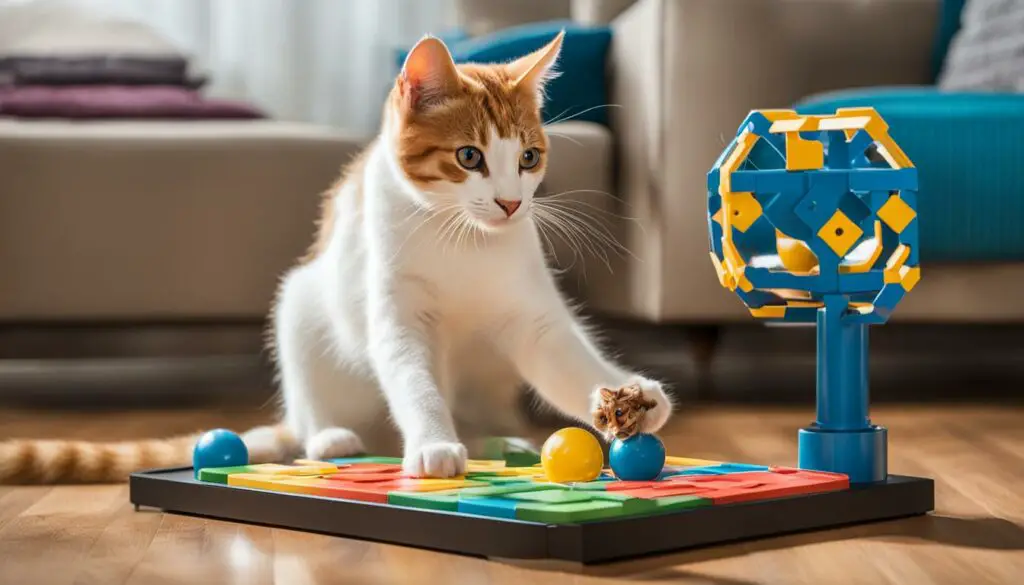
Conclusion
Stopping your cat from begging for food requires a combination of cat food training and behavior modification techniques. Understanding the underlying reasons behind your cat’s begging behavior is crucial in addressing it effectively. By implementing these strategies, you can create a healthier and more balanced relationship with food for your feline companion.
Start by ensuring that your cat is getting a nutritious and balanced diet that meets their specific needs. Incorporating wet food into their meals can help keep them feeling fuller for longer and reduce the urge to beg for more food. Establishing mealtime rules and boundaries, such as using a food puzzle bowl, can also help regulate their eating habits and prevent excessive begging.
In addition to proper feeding habits, it’s important to create a stimulating environment for your cat. Engage in regular playtime and provide them with interactive toys and mental enrichment activities to keep them entertained and prevent boredom-related begging behavior.
If your cat’s begging behavior persists despite your efforts, don’t hesitate to consult a professional cat behaviorist. They can provide tailored recommendations and guidance to help address the root cause of the behavior and modify it effectively. Remember to be patient and consistent in your approach, always prioritizing your cat’s health and well-being.
FAQ
Why is my cat always hungry?
Cats may be always hungry due to various reasons, including their natural instinct for routine feeding times, seeking attention, abnormal feeding behavior, teasing from their food bowl, presence of worms, or medical conditions like hyperthyroidism.
How can I break the begging habit in my cat?
Breaking the begging habit requires a combination of strategies, including keeping your cat calm, praising them during mealtime, establishing a routine, being firm and ignoring their begging, and introducing a food puzzle bowl for mental stimulation and slower eating.
Should I give in to my cat’s demands for treats or sharing my own food with them?
No, it’s important to establish proper feeding habits and not give in to your cat’s demands. Consistency and discipline in feeding routines can help your cat understand meal boundaries and avoid overeating. Show love and attention to your cat in non-food-related ways.
How much food should I feed my cat?
The amount of food depends on factors such as breed, lifestyle, body condition, and age. Active adult cats usually require around 240 calories per day. It’s important to measure meal portions and provide opportunities for exercise to regulate their food intake.
What should I do if my cat’s begging behavior persists?
If your cat’s begging behavior continues despite your efforts, it may be beneficial to seek the help of a professional cat behaviorist. They can assess the root cause of the behavior and provide tailored recommendations to address it.
How can I create a stimulating environment for my cat?
Increasing playtime and providing a stimulating environment can prevent boredom-related begging behavior. Engage in interactive play sessions, offer scratching posts or cat trees, and provide elevated spaces for your cat to climb and observe their surroundings.
Why is it important to establish proper feeding habits for my cat?
Establishing proper feeding habits helps your cat maintain a healthy weight and avoid overeating. Consistency and discipline in feeding routines can create a healthier relationship with food for your cat.
What type of food should I feed my cat?
Providing a high-quality diet that meets your cat’s nutritional needs is essential for their overall health and satisfaction. Wet food can be more filling for cats, and gradually incorporating it into their diet can help reduce begging behavior.
How can I stop my cat from begging for food?
Stopping your cat from begging for food involves understanding the underlying reasons, implementing appropriate training techniques, providing a balanced diet, engaging in regular playtime, establishing mealtime rules, and seeking professional help if necessary.
What can I do if my cat has abnormal feeding behavior?
Abnormal feeding behavior can be a sign of psychogenic abnormal feeding behavior, which is often caused by emotional stress. Playing with your cat and rewarding positive behavior can help change their attitude towards food.
Can worms cause cats to feel constantly hungry?
Yes, worms can cause cats to feel constantly hungry as they steal nutrients from their food. Regular worming is essential to prevent worms and alleviate hunger caused by their presence.

